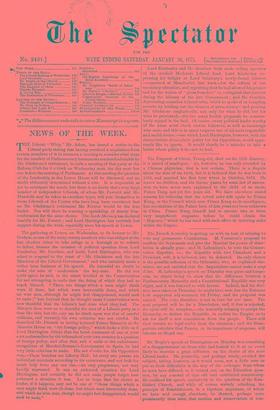The gathering at Lewes, on Wednesday, to do honour to
Mr. Dodson, as one of the many county members who was obliged at the last election either to take refuge in a borough or to submit -to defeat, became the occasion of political speeches from Lord Kimberley, Mr. Goschen, and lastly, Lord Hartington, who was asked to respond to the toast of " Mr. Gladstone and the late Members of the Liberal Government," and who certainly made a rather lame business of his speech. He intended no doubt to make the note of I moderation' the key-note. He did not quite agree, he said, in the taunt levelled at the Conservatives for not attempting to undo that the doing of which they had so much blamed. " There are things which a man might think were ill done, but which were irrevocably done,, and which no wise man, although he might feel disappointed, would seek to undo ;" but, beyond that, he thought many Conservatives were now thankful that the Liberals had done what they had. The Marquis then went on to describe the uses of a Liberal party at a time like this, but the only use he dwelt upon was that of careful -criticism, and certainly his own criticism was not careful. He described Mr. Disraeli as having lectured Prince Bismarck at the Mansion House on " his foreign policy," which looks a little as if Lord Hartington thinks that the harsh treatment of one of your c wn ambassadors by the tribunals of your own country is a question of foreign policy, and after that, and a smile at the unfortunate recognition of Marshal4gerrano's Government in Spain, he had very little criticism to make. His mot d'ordre for the Opposition was,—These benches are Liberty Hall ; let every one pursue his individual crotchets according to his conscience, and not look for much help from any one else,—an easy programme, not very lucidly expressed. It was an awkward situation for Lord Hartington, and certainly he did not make people forget how awkward a situation it was. Let us hope that his choice as leader, if it happens, may not be one of " those things which a man might think were ill-done, but which were irrevocably done, and which no wise man, though he might feel disappointed, would seek to undo."


































